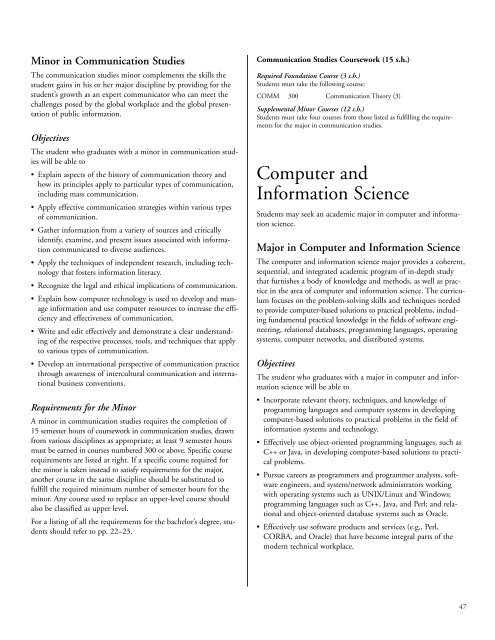1a. IntroSUS 2003 - University of Maryland University College
1a. IntroSUS 2003 - University of Maryland University College
1a. IntroSUS 2003 - University of Maryland University College
- No tags were found...
You also want an ePaper? Increase the reach of your titles
YUMPU automatically turns print PDFs into web optimized ePapers that Google loves.
Minor in Communication StudiesThe communication studies minor complements the skills thestudent gains in his or her major discipline by providing for thestudent’s growth as an expert communicator who can meet thechallenges posed by the global workplace and the global presentation<strong>of</strong> public information.ObjectivesThe student who graduates with a minor in communication studieswill be able to•Explain aspects <strong>of</strong> the history <strong>of</strong> communication theory andhow its principles apply to particular types <strong>of</strong> communication,including mass communication.•Apply effective communication strategies within various types<strong>of</strong> communication.•Gather information from a variety <strong>of</strong> sources and criticallyidentify, examine, and present issues associated with informationcommunicated to diverse audiences.•Apply the techniques <strong>of</strong> independent research, including technologythat fosters information literacy.•Recognize the legal and ethical implications <strong>of</strong> communication.•Explain how computer technology is used to develop and manageinformation and use computer resources to increase the efficiencyand effectiveness <strong>of</strong> communication.•Write and edit effectively and demonstrate a clear understanding<strong>of</strong> the respective processes, tools, and techniques that applyto various types <strong>of</strong> communication.•Develop an international perspective <strong>of</strong> communication practicethrough awareness <strong>of</strong> intercultural communication and internationalbusiness conventions.Requirements for the MinorA minor in communication studies requires the completion <strong>of</strong>15 semester hours <strong>of</strong> coursework in communication studies, drawnfrom various disciplines as appropriate; at least 9 semester hoursmust be earned in courses numbered 300 or above. Specific courserequirements are listed at right. If a specific course required forthe minor is taken instead to satisfy requirements for the major,another course in the same discipline should be substituted t<strong>of</strong>ulfill the required minimum number <strong>of</strong> semester hours for theminor. Any course used to replace an upper-level course shouldalso be classified as upper level.For a listing <strong>of</strong> all the requirements for the bachelor’s degree, studentsshould refer to pp. 22–23.Communication Studies Coursework (15 s.h.)Required Foundation Course (3 s.h.)Students must take the following course:COMM 300 Communication Theory (3)Supplemental Minor Courses (12 s.h.)Students must take four courses from those listed as fulfilling the requirementsfor the major in communication studies.Computer andInformation ScienceStudents may seek an academic major in computer and informationscience.Major in Computer and Information ScienceThe computer and information science major provides a coherent,sequential, and integrated academic program <strong>of</strong> in-depth studythat furnishes a body <strong>of</strong> knowledge and methods, as well as practicein the area <strong>of</strong> computer and information science. The curriculumfocuses on the problem-solving skills and techniques neededto provide computer-based solutions to practical problems, includingfundamental practical knowledge in the fields <strong>of</strong> s<strong>of</strong>tware engineering,relational databases, programming languages, operatingsystems, computer networks, and distributed systems.ObjectivesThe student who graduates with a major in computer and informationscience will be able to•Incorporate relevant theory, techniques, and knowledge <strong>of</strong>programming languages and computer systems in developingcomputer-based solutions to practical problems in the field <strong>of</strong>information systems and technology.•Effectively use object-oriented programming languages, such asC++ or Java, in developing computer-based solutions to practicalproblems.•Pursue careers as programmers and programmer analysts, s<strong>of</strong>twareengineers, and system/network administrators workingwith operating systems such as UNIX/Linux and Windows;programming languages such as C++, Java, and Perl; and relationaland object-oriented database systems such as Oracle.•Effectively use s<strong>of</strong>tware products and services (e.g., Perl,CORBA, and Oracle) that have become integral parts <strong>of</strong> themodern technical workplace.47

















